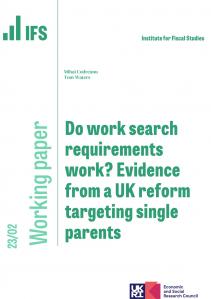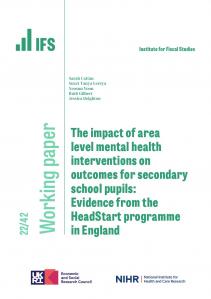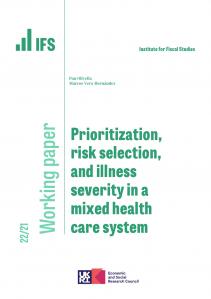Collection
Briefing and analysis
The new Office for Budget Responsibility published its forecasts for growth and borrowing on Monday 14 June 2010. Chancellor George Osborne delivered the coalition Government's first Budget on Tuesday 22 June.
On Wednesday 23 June, the day following the Budget, the Institute for Fiscal Studies held a lunchtime briefing.
Presentations from the briefing:
- Opening remarks, Robert Chote
- Public finances: more done, more quickly, Gemma Tetlow
- Public services: serious cuts to come, Rowena Crawford
- Business and capital taxes, Stuart Adam
- Welfare savings, Mike Brewer
- Personal taxes and distributional impact of Budget measures, James Browne (Please note: An updated analysis of the distributional impact has now been published).
Office for Budget Responsibility
- A chapter in the IFS Green Budget 2010 looked at the possibilities for reforming UK fiscal institutions as part of the solution to the repairing damage to the public finances done by the financial crisis.
- In a speech to the Scottish Economic Society, Robert Chote outlined the ways in which the fiscal forecasting process could be made more independent. See the press release: keeping the official forecasts honest.
- Robert Chote took part in BBC Radio 4's Analysis on 7 June, which dealt with the issue of the OBR.
- The newly created independent Office for Budget Responsibility (OBR) published its first set of official forecasts for the economy and the public finances on 14 June. A press release published outlines some initial thoughts from Robert Chote, Rowena Crawford, Carl Emmerson and Gemma Tetlow.
Public finances
- On 10 July Public Finance Magazine published an article The axeman cometh by Rowena Crawford and Gemma Tetlow.
- On 17 May Carl Emmerson gave a presentation at the Institute for Government on how big the hole in the public finances is and what filling it might mean for spending on public services.
- Before the recent general election Robert Chote, Rowena Crawford, Carl Emmerson and Gemma Tetlow examined what the three main UK parties said (explicitly and implicitly) about the scale, timing and composition of the fiscal repair jobahead, teasing out the differences and similarities.
Other recent publications
- Robert Chote's observation, Tax increases: quality, not just quantity, looks at whether the Coalition should demonstrate a commitment to tax reform that goes beyond the design of any revenue raising measures when trying to tackle the structural deficit.
- Some initial reaction to the Tory / Lib Dem coalition agreement.
- An article by Robert Chote in the Sunday Times look at past and possible future reforms to Capital Gains Tax.
- A history of state pensions in the UK describes state pension provision in the United Kingdom from the inception of the basic state pension in 1948, following the Beveridge Report, to Pensions Act 2007 and the plans of the Conservative/Liberal Democrat coalition government.
- Poverty and inequality in the UK: 2010 assessed the changes to average incomes, inequality and poverty that have occurred since 1979, with a particular focus on the changes that have occurred in the latest year of data (2008-09) and since 1996-97.
Election 2010
Our analysis for the election looked at Labour's record and at the parties' proposals. The work was funded by the Nuffield Foundation.
Green Budget 2010
The IFS Green Budget 2010 assessed key questions that the Chancellor had to confront for the previous 2010 Budget. The areas covered are fiscal policy, fiscal stimulus and the consumer, options for fiscal tightening: tax increases and benefit cuts, public spending and the public finances, public sector pay and pensions, support for research and innovation, potential cuts to public services and reforming the UK's fiscal institutions . Published in collaboration with Barclays Capital and Barclays Wealth, the Green Budget also discusses the UK's productive capacity, the economic outlook and the public finances and sterling.
IFS Observations
Our "observations" allow us to provide an immediate reaction to policy changes and debate, without issuing a full press release. Recent observations include the following:
- The first cut The new coalition Government has announced a £6.2 billion headline cut to public spending in the current year. Since £500 million is being recycled into additional spending or tax cuts, and the £704 million earmarked for devolved administrations does not have to be found until next year, the likely reduction in borrowing in 2010-11 is around £5 billion. This is less than a tenth of the fiscal repair job that Alistair Darling's March 2010 Budget forecast suggested will be needed over the next few years.
- New schools nice, but at what price? The coalition government has announced ambitious plans for a new generation of schools inspired by the Swedish model of "free schools." Creating these new schools will clearly involve a capital cost. However, capital spending is likely to be significantly cut across most departments over the next four years, education included. Unless the new schools programme is to be very modest, plans for overall capital spending will need to be revised upwards or the cuts to investment spending elsewhere will be extremely deep.
- What can be done to simplify benefits and strengthen work incentives? Iain Duncan Smith, the Secretary of State for Work and Pensions, today gave a little more detail on the Government's plans for welfare reform, suggesting that the benefit system needed simplifying, incentives to work strengthening, and welfare-to-work programmes reforming. But what can actually be done?








